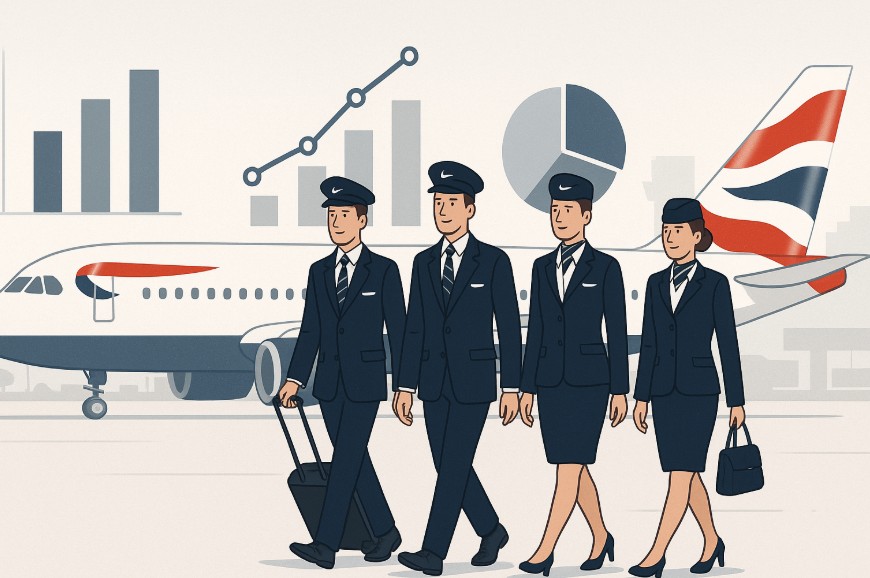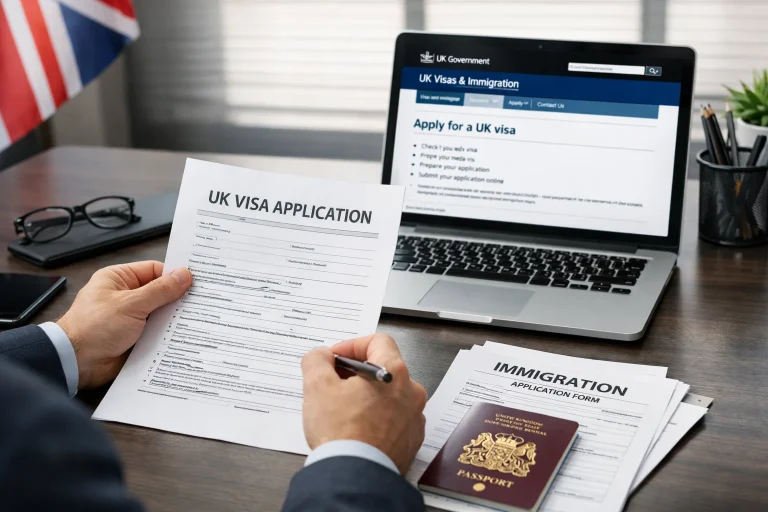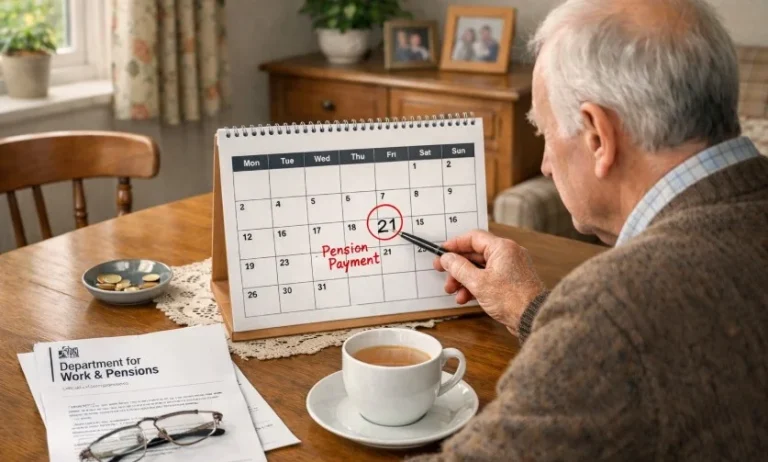The aviation industry continues to be a dynamic field in the UK, offering both excitement and challenges for those working on the front lines particularly flight attendants. In 2025, as airlines recover and expand operations post-pandemic, interest in cabin crew roles has soared.
This article explores the earnings of flight attendants in the UK, examining key salary data, employment benefits, career growth, and economic factors impacting income.
What Is the Average Salary for Flight Attendants in the UK in 2025?
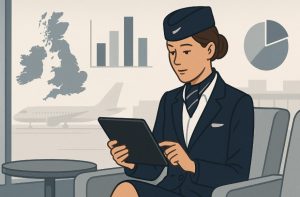
In 2025, flight attendants in the UK earn an average annual salary of £23,500, which is equivalent to about £12.05 per hour. This figure is based on a broad analysis of salaries across various airlines, roles, and levels of experience.
Here is a detailed comparison of salary ranges:
| Experience Level | Annual Salary | Hourly Rate |
| Entry-Level | £21,674 | £11.10 |
| Average (Median) | £23,500 | £12.05 |
| Experienced Crew | £43,507 | £22.25 |
These numbers show that while entry-level flight attendants begin near the £21,674 mark, seasoned professionals can earn up to £43,507 annually depending on the airline and the nature of their routes.
How Do Salaries Differ Between Major UK Airlines?
Salaries for flight attendants vary widely between airlines in the UK. Legacy carriers generally offer higher pay and more benefits, while budget airlines provide competitive base salaries supplemented by performance-based incentives.
| Airline | Typical Annual Salary | Key Notes |
| British Airways | £30,000 to £43,000 | Long-haul routes and seniority raise pay |
| EasyJet | £22,000 to £26,000 | Includes flight pay and bonuses |
| Ryanair | £21,000 to £25,000 | Lower base pay, higher commission on sales |
Flight attendants working for British Airways typically benefit from generous travel perks, structured pay progression, and premium route allowances.
EasyJet pays slightly less but offers flexible contracts and shorter regional routes. Ryanair, while offering a lower base salary, supports commission on sales that can significantly enhance monthly earnings.
What Factors Affect A Flight Attendant’s Salary In The UK?
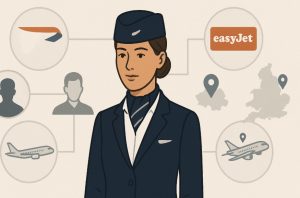
The salary of a flight attendant in the UK is shaped by various factors, ranging from the airline they work for to the types of routes they operate.
While most airlines follow a basic pay structure, individual circumstances and career choices can lead to significant differences in earnings. Below are the main influences that determine how much a flight attendant earns.
Type of Airline and Business Model
The airline itself plays a crucial role in determining base pay and overall earning potential. Full-service airlines like British Airways or Virgin Atlantic tend to offer higher salaries, longer-haul routes, and generous travel perks. These carriers often include overnight allowances, pension contributions, and paid training programmes.
In contrast, budget airlines such as EasyJet or Ryanair usually offer lower base salaries but may supplement income through performance-based incentives, such as sales commissions or additional sector pay.
While the starting salaries may differ significantly, the overall compensation packages from budget carriers can still be competitive, especially for those who fly frequently or achieve high in-flight sales.
Years of Experience and Seniority
As with most professions, salary increases over time. New entrants to the industry start on the lower end of the pay scale. However, with each year of experience, flight attendants generally receive incremental raises.
Seniority also leads to promotion opportunities, such as becoming a lead crew member or a purser, which come with higher responsibility and increased pay.
Some airlines follow structured pay bands, where crew members automatically progress after a certain number of flying hours or service years. Longevity in the industry not only boosts earnings but also opens doors to leadership training and management roles within the cabin crew hierarchy.
Type of Flight Routes
Flight routes significantly impact salary. Attendants on long-haul flights usually receive higher pay, particularly when the route includes overnight stays in foreign cities. These layovers attract allowances that cover meals, accommodation, and additional time away from base.
On the other hand, short-haul or domestic routes often involve multiple flights in one day and do not provide the same level of additional compensation.
However, attendants flying short routes more frequently can accumulate more flying hours in a month, which may help balance their earnings.
Flight Hours and Scheduling
Most airlines compensate flight attendants based on the number of hours flown. A standard full-time schedule may involve 75 to 90 flying hours per month.
The more hours flown, the higher the monthly salary. In addition, flights scheduled during weekends, holidays, or night hours often attract higher rates or additional bonuses.
However, longer hours also come with greater physical demands. Flight attendants must carefully manage their schedules to maintain work-life balance while optimising income. Some may choose to pick up additional flights voluntarily to increase their monthly take-home pay.
Location and Base Assignment
The location where a flight attendant is based also affects their salary. Major hubs like London Heathrow or Gatwick generally provide higher allowances due to the increased cost of living in the area.
Attendants stationed at these bases often have access to international routes, which can lead to better earning potential through layover allowances and long-haul bonuses.
In contrast, regional bases such as Manchester, Glasgow, or Birmingham may not offer location-based pay adjustments but typically come with lower living expenses. The trade-off is often fewer route options and less international travel.
Contract Type and Employment Terms
Contractual status is another important determinant of salary. Full-time staff enjoy stable monthly salaries, consistent flight schedules, and access to benefits like pension schemes and health insurance. These employees are also more likely to receive annual bonuses and structured career development.
Part-time, seasonal, or zero-hour contracts are more flexible but come with less predictable income. While these roles are ideal for those seeking work-life balance or secondary income, they typically do not include benefits and often have limited flight hour guarantees. As a result, total annual earnings for part-time attendants are usually lower.
Qualifications and Additional Skills
Flight attendants with extra qualifications or skills may earn more than their peers. For example, crew members fluent in multiple languages are often preferred for international flights and may receive language pay differentials.
Those trained in first aid, emergency response, or with supervisory experience can qualify for specialised roles that pay above the standard rate.
Additionally, airlines may reward crew who complete internal training courses or who take on added responsibilities such as mentoring new staff or managing cabin operations on larger aircraft.
Performance and Incentive Bonuses
Some airlines in the UK link compensation to performance metrics. This includes customer service feedback, attendance records, and punctuality. Attendants who consistently meet or exceed service standards may receive end-of-year bonuses or be given priority for more profitable flights.
Sales performance is another area where crew members can boost earnings. Onboard sales of food, beverages, and duty-free products often come with commission-based incentives, particularly on short-haul flights where direct customer interaction is more frequent.
How Does Flight Attendant Pay Progress With Experience?
Flight attendants in the UK often experience salary growth aligned with their tenure, responsibilities, and airline-specific progression structures. Career growth typically involves moving from entry-level roles to senior cabin crew, then potentially into leadership or training roles.
Here is a general outline of salary progression by years of experience:
- 0–2 years: Between £21,000 and £24,000 annually, mostly working domestic or short-haul flights
- 3–6 years: Salaries grow to between £25,000 and £30,000 with mid-level responsibilities
- 7+ years: Experienced attendants can earn from £35,000 to over £43,000, particularly on long-haul international routes
Many airlines operate a structured step-based salary increment system. Loyalty bonuses, flying time bonuses, and night shift allowances further support income growth as experience accumulates.
How To Become A Flight Attendant In The UK?
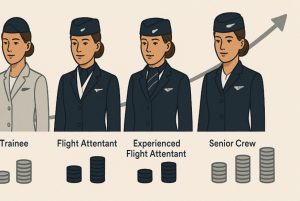
Becoming a flight attendant in the UK is a competitive but rewarding career choice. Airlines look for individuals with excellent communication skills, professionalism, and a customer-first attitude. The process involves meeting basic eligibility requirements, completing training, and passing assessments.
Meeting Basic Entry Requirements
To start a career as a flight attendant in the UK, candidates must meet a set of standard requirements. These include:
- Being at least 18 years old
- Having a minimum of GCSEs in English and Maths (or equivalent)
- Holding the right to live and work in the UK
- Having a valid passport with no travel restrictions
- Meeting minimum height requirements (usually around 5’2” to 6’2”) and being able to reach emergency equipment overhead
- Being physically fit and confident in swimming, usually a minimum of 25 metres unaided
Good personal presentation, a professional manner, and strong customer service experience are also preferred by most airlines.
Gaining Relevant Experience And Skills
Although not mandatory, prior experience in hospitality, retail, or tourism can strengthen an application. Airlines value soft skills such as:
- Patience and resilience under pressure
- Conflict resolution and problem-solving
- Cultural awareness and multilingual abilities
- Attention to detail and safety consciousness
Completing a customer service or aviation course from a recognised college or training centre can also provide a competitive advantage.
Applying To Airlines And Passing Assessments
Once qualified, aspiring flight attendants apply directly to airlines through their recruitment portals. The hiring process typically includes:
- Online application and CV submission
- Online aptitude or personality assessments
- Group assessment days including role-plays and team exercises
- Individual interviews with HR or cabin crew managers
Applicants must also pass background checks, medical examinations, and sometimes psychometric testing.
Completing Airline Training Programmes
Successful applicants are enrolled in an intensive airline-specific training programme that typically lasts 4 to 8 weeks. Training includes:
- Emergency procedures and safety drills
- First-aid and medical response
- Firefighting simulations
- Customer service excellence and complaint handling
- In-flight service training (meals, announcements, duty-free)
After passing final assessments, trainees are issued with an Air Cabin Crew Attestation, which certifies them for flying duties within the UK and EU.
Securing a Base and Flight Schedule
Once certified, new crew members are assigned a base airport and scheduled on short-haul or long-haul flights depending on airline operations and contract terms. Ongoing training, periodic re-certification, and development opportunities are provided throughout their career.
What Additional Benefits Do UK Flight Attendants Receive?
Beyond their base salary, UK flight attendants receive a variety of financial and non-financial benefits. These perks form a significant part of the total remuneration package and often compensate for the demanding nature of the job.
Some common benefits include:
- Free or discounted airline tickets for employees and family
- Meal allowances for long-haul or layover flights
- Performance-based bonuses linked to customer feedback or punctuality
- Employer-contributed pension schemes
- Health insurance packages and mental health support
- Annual leave, often more generous than standard industry packages
Flight attendants with seniority or long-standing contracts may also access business class travel discounts, extended holiday days, and additional financial incentives tied to performance and length of service.
How Does Part-Time Work Affect Flight Attendant Earnings?
Part-time flight attendants in the UK generally receive an hourly rate similar to full-time staff but work fewer scheduled hours. While this arrangement offers greater flexibility, it results in a reduced annual income and fewer opportunities to earn bonuses or flying time pay.
Typical features of part-time roles include:
- Pro-rated salaries based on flying hours
- Limited access to benefits such as pensions or performance bonuses
- Often structured around specific days of availability, such as weekends or seasonal surges
- Common among parents, students, or individuals with other professional commitments
For example, a part-time flight attendant working 50% of a full-time schedule may earn approximately £11,500 to £13,000 annually, excluding additional allowances.
How Does The Cost Of Living Impact A Flight Attendant’s Lifestyle In The UK?
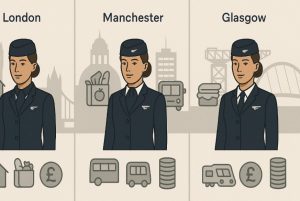
The cost of living in various UK cities significantly influences how far a flight attendant’s salary can stretch. While earnings may be consistent across regions, the expenses of living in a metropolitan area like London can offset higher pay scales.
Here is a comparative breakdown of estimated monthly expenses and typical income:
| City | Monthly Cost of Living (1 person) | Avg. Monthly Net Salary |
| London | £1,700 – £2,000 | £1,800 – £2,300 |
| Manchester | £1,300 – £1,500 | £1,800 – £2,100 |
| Glasgow | £1,100 – £1,400 | £1,800 – £2,000 |
Flight attendants based out of London often receive slightly higher wages or location allowances, but rental costs and daily expenses are also higher. Those based in regional airports may have fewer expenses but also more limited flight routes and income opportunities.
Is Being A Flight Attendant In The UK Financially Rewarding In 2025?
In 2025, being a flight attendant in the UK offers a balance between modest entry-level salaries and long-term financial growth. While initial pay may appear lower compared to other professions, strong career progression, significant non-cash benefits, and opportunities for international travel contribute to the overall financial appeal of the role.
Airline contracts, route types, and employment terms all play an important role in determining actual earnings, and motivated individuals can increase their compensation significantly over time. For those passionate about aviation and travel, the profession remains a viable and rewarding career path.
FAQs about Flight Attendant Salary in the UK
What qualifications are needed to become a flight attendant in the UK?
Most airlines require GCSEs in English and Maths, good customer service skills, and successful completion of their training programme. Previous experience in hospitality is often a plus.
Are flight attendants paid during training in the UK?
This depends on the airline. Some provide a training allowance or stipend, while others offer unpaid training followed by full employment.
Can UK flight attendants make extra money through commissions?
Yes, many budget airlines offer commissions on in-flight sales, which can add several hundred pounds per month to their base salary.
How often are flight attendants paid in the UK?
Most UK airlines pay flight attendants on a monthly basis, with allowances and commissions often included in the same payment cycle.
What are typical working hours for a UK flight attendant?
Working hours can vary greatly, often including early mornings, late nights, weekends, and holidays. On average, flight attendants work 75–90 flying hours per month.
Do flight attendants get overtime pay?
Overtime pay is not always standard. However, extra hours beyond scheduled flying time may be compensated through additional allowances or time off, depending on the airline’s policy.
Are salaries expected to rise in the next few years?
Yes, due to growing demand for air travel and increased competition among airlines, salaries are expected to increase gradually over the next 3–5 years.

